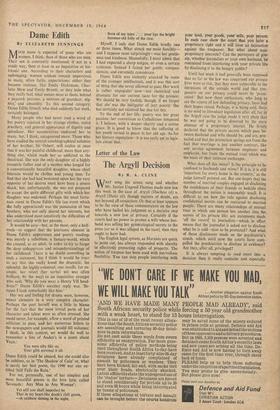Dame Edith
By ELIZABETH JENNINGS MUCH more is expected 'of poets who are women, I think, than of those who are Men. Their sex is constantly mentioned, if not in a crude way, then at least in an inquisitive or his- trionic one. According to their characters and upbringing, women seldom remain imperviouS to many, often futile, expectations; either they become recluses, like Emily Dickinson, Char- lotte Mew and Emily Bronte, or they hide what they really feel, what means most to them, behind a peacock persona, a mixture of grandeur, dig- nity, and absurdity. To this second category, Dame Edith Sitwell,' who died suddenly last week, certainly belonged.
Many people who had never read a word' of her poetry rejoiced in her Strange clothes, weird jewellery, and general appearance of dignity and splendour. Her eccentricities endeared her to' many, but, I think, antagonised more. Those who have studied the several autobiographical voluines of her brother, Sir Osbert, will realise at once that it was her painful childhood, more than any- thing else, which made her so addicted to the theatrical. She was the only daughter of a highly eccentric father and of a mother who longed for a conventionally beautiful daughter, whose chief interests would be clothes and young men. To find that she had had bestowed upon her the very opposite of her desires must have been a severe shock, but, unfortunately, she was not prepared to accept the quite different gifts with which her daughter was endowed. Perhaps the most fortu- nate event in Dame Edith's life (an event which she fully appreciated) was the possession of two brothers, who not only' shared her interests, but alio understood most sensitively the difficulties of her relationship with her parents.
It would be easy—but, at the most, only a half- truth—to suggest that the histrionic element in Dame Edith's appearance and poetry readings was merely a substitute, a fantasy-world, which she created, as an adult, in order to try to forget the deep unhappiness and misunderstandings of her childhood. There is no doubt something in such a statement, but I think it would be truer to say that she really loved the dramatic, the splendid, the highly-coloured; one recalls, for ex- ample, her retort (her verbal wit was often brilliant, by the way) to an inquisitive stranger who said, 'Why do you wear a Henry VII head- dress?' Dame Edith's succinct reply was, 'Be- cause I look remarkably like him.'
Her wit and feeling for drama were, however, minor elements in a very complex character. Perhaps the poet herself was a little to blame for the fact that the' most trivial parts of her character and talent were so often stressed. She could never, for example, allow a word of printed criticism to pass, and her numerous letters to the newspapers and journals would fill volumes; I think, in this context, we would do well to remember a line of . Auden's in a poem about Yeats: You were silly like us; Your gifts survived it all.
Dame Edith could be absurd, but she could also be sublime, as in 'The Shadow of Cain' or, what is surely her best poem, the 1940 war one en- titled 'Still Falls the Rain.', For me, personally, one of her simplest and most beautiful poems is the love lyric called 'Serenade: Any Man to Any Woman': Yet still you shall imperfect be That in my heart-like death's chill grows, —A rainbow shining in the night, Born of my tears . . your lips the bright Summer-old folly of the rose.
Myself, I only met Dame Edith briefly two or three times. What struck me most forcibly— and I suppose most surprisingly—was her gentle- ness and kindness. Shamefully, I must admit that I had expected a sharp tongue, or even a certain cynicism. Instead I found her gentle, compas- sionate, and'eXtretnely considerate. • Dame Edith was violently attacked by some of the younger intellectuals, and it.was this sort of thing that she never allowed to pass. Her'work is rather unpopular now—too rhetorical and dramatic for our current taste for the prosaic. We should be Very foolish, though, if we forgot that she was the 'instigator of jazz poetry. She has certainly not received her due for this.
To the end of her life, poetry was her great passion; her conversion to Catholicism tempered it, I believe,. with a 'deeper charity and a serene grace. It is good 'to know that the suffering of her youth turned to peace in her old age. As for her literary reputation—it is too.early yet to legis- late about that.




























 Previous page
Previous page